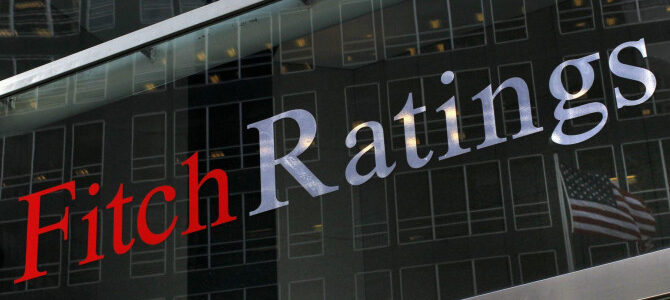
Fitch Ratings has affirmed Ukraine’s Long-term foreign currency Issuer Default Rating (IDR) at “CC”, the agency said in a statement on its website.
“The affirmation of Ukraine’s IDR in foreign currency at ‘CC’ reflects Fitch’s expectations for further restructuring of commercial debt before the end of the two-year break in Eurobond payments in September 2024,” the agency said.
It notes that sovereign foreign debt service will increase to $7.6bn in 2025, large budget deficits over the medium term will increase already high public debt and burden sharing with commercial creditors is a likely condition for continued official sector support.
According to Fitch, Ukraine is likely to opt for a single comprehensive debt restructuring next year. However, if security uncertainty persists, the agency expects an interim step in the form of a further deferral of Eurobond payments, similar to how official creditors have agreed to extend the moratorium on payments until the end of 2026 under the EFF with Ukraine.
It is also clarified that Fitch has affirmed the IDR at “CCC-” in local currency. It explained that the higher rating than that of the debt in foreign currency reflects the greater obstacles to restructuring the debt in local currency, given that only 4% belong to non-residents, while 48% belong to the National Bank of Ukraine and 38% to Ukrainian banks, including half of the state banks.
“We do not see significant international pressure to restructure domestic debt, including due to risks to domestic demand for government debt and confidence in banks. Nevertheless, there is still significant credit risk over the longer term, given uncertainty about the sources of funding for a potentially protracted war and a significant recovery effort,” the report said.
According to it, Fitch’s baseline scenario assumes the war will last until 2024 within its current broad parameters.
“We believe that Ukraine currently has a strategic military advantage, backed by modernized weaponry, Western intelligence, and firm resolve. However, in our core scenario, military superiority is not sufficient for decisive achievement of objectives,” the rating agency pointed out.
It added that there is also a lack of politically credible concessions that could form the basis of a negotiated settlement, which could lead to a very protracted conflict.
“In the longer term, we expect some form of settlement to end the war, although we think a frozen conflict is more likely than a sustained peace agreement,” Fitch wrote.
It predicts GDP will grow by 3.5% in 2023 and 4.0% in 2024 after a 29% contraction in 2022. According to the agency, consumption will recover somewhat on easing fears of a broader military escalation, but investment remains depressed. Fitch believes this year’s planned $14 billion in emergency recovery spending will fall short.
The agency expects the budget deficit this year to rise to 17.3 percent of GDP from nearly 16 percent of GDP (25 percent of GDP excluding international grants) last year because of war-related spending and a reduction in the grant component of budget support.
“We expect the deficit to remain high in the medium term, in part because of huge reconstruction needs and structurally higher defense spending than before the war,” the report states.
The agency adds that it sees greater uncertainty about external financing beyond next year, in part because of potential donor fatigue.
Fitch also predicts that the government debt will rise to 85% of GDP by the end of 2023 and to 94% by the end of 2024, while last year it increased by 30 percentage points (p.p.) to 78.5% of GDP.
According to the agency, the USD/UAH peg will remain in place until 2023, with a moderate depreciation in 2024 as the exchange rate becomes more flexible and exchange controls gradually loosen.
Fitch also forecasts an increase in the current account deficit to a deficit of 1.8% of GDP in 2023 and 3.5% in 2024, from a surplus of 5% in 2022, as imports recover faster than exports.
“Large official sector loans and gradually improving net migration help bolster our forecast of an increase in international reserves to $38.9 billion at the end of 2023, equivalent to 4.8 months of current external payments, above the median for all B-rated sovereigns,” the report said.
Fitch forecasts that inflation will fall to 14.5% at the end of this year and to 12.7% on average in 2024 from 15.3% at the end of May and 26.6% last year. According to the agency, the National Bank will lower the discount rate by 5 p.p. – to 20%, but the risks are still skewed upwards, including the consequences of the Kakhovka dam collapse.